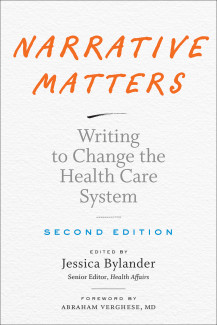
Johns Hopkins UniversityEst. 1876
America’s First Research University
Writing Can Change Health Care

For more than 20 years, the “Narrative Matters” section of the health policy journal Health Affairs has showcased some of the most compelling personal stories in health care. I have edited the section since the fall of 2012, following in the footsteps of Ellen Ficklen, Kyna Rubin, and the section’s founding editor, the late Fitzhugh Mullan. When Mullan launched the section in 1999 with the encouragement of John Iglehart, the founding editor of Health Affairs, he and the rest of the Health Affairs team envisioned it as an opportunity to leverage the power of storytelling – with all its depth, drama, and emotion – to bring a human, and humane, perspective to research data and to policy debates. As a happy by-product, we’ve also nurtured this form of writing (what we call the “policy narrative,” but also the genre of medical and health narratives more broadly) by creating a regular space for it, and providing peer review and editorial guidance to authors. In 2006, Mullan, Ficklen, and Rubin gathered some of the most popular Narrative Matters essays in a collection called Narrative Matters: The Power of the Personal Essay in Health Policy (Johns Hopkins University Press, 2006). In the time since that edition was published, the genre of medical and health narratives, often called “narrative medicine” a la Rita Charon’s groundbreaking program at Columbia University, has exploded. To date, Health Affairs has published more than 250 essays in the Narrative Matters section – along with some poetry. Time flies, and it has now been nearly a decade-and-a-half since that first edition came out. We felt it was time for an updated collection featuring some of our favorite recent essays.
The subtitle of the new edition of Narrative Matters might sound ambitious – “writing to change the health care system” – but we do believe writing is that powerful. These essays will stay with you, long after you’ve put the book down and gone about your day. We know anecdotally that they’ve been used in health advocacy and decision-making. And we know that they enrich, rather than replace, important health care research findings, while also giving voice to subtle issues within health care that research can’t tackle. Sharing intimate details of sometimes-painful health care experiences takes extreme courage, and we’re grateful to our authors for going on this journey with us. Mullan himself chronicled his deeply personal experiences as a physician and cancer survivor in his writing, including in his books Vital Signs: A Young Doctor’s Struggle With Cancer (Dell Publishing Company, 1984) and White Coat, Clenched Fist: The Political Education of an American Physician (Macmillan, 1976). Mullan, who was very supportive of and excited about this new edition, died from complications of cancer on November 29, 2019. This book is dedicated to him.

The topics covered in this new volume touch on familiar health care challenges such as appropriate end-of-life care, as well as new issues of the day, including opioid use disorders, transgender health care, and the impact of national immigration policies on the practice of medicine. Contributors include Pulitzer Prize–winner Siddhartha Mukherjee, MacArthur fellow Diane Meier, former Planned Parenthood president Leana S. Wen, former secretary of health and human services Louis W. Sullivan, and National Humanities Medal recipient Abraham Verghese, who also authored a new foreword for this edition.
Importantly, the growing field of medical and health narratives is not just about documenting complaints with the health care system and highlighting its failures. To be sure, that’s an important function of the genre, and many of the essays in this volume do shed light on systemic problems in health care, and offer potential solutions. For instance, in “‘Go Back To California: When Providers Fail Transgender Patients,” transgender doctor Laura Arrowsmith writes that doctors in training learn about obscure medical diseases that they may never encounter in medical practice, yet are not taught how to care for transgender patients – a population they will almost certainly encounter in practice. Still, health care offers lessons beyond the “horror stories,” and there’s a place in the genre to document where health care gets it right, too. I’m glad we were able to highlight that in several essays in the volume, such as in Maureen Mavrinac’s “Rethinking the Traditional Doctor’s Visit,” which shows how shared medical appointments can create new paths to healing in health care, and in “‘I Don’t Want Jenny to Think I’m Abandoning Her’: Views on Overtreatment” by Diane Meier, in which the author, a palliative care physician, teaches an oncologist that sometimes the most compassionate way to care for a patient is to know when to give up treatment.
This new edition of Narrative Matters would make an excellent teaching tool in a variety of courses. Beyond that, it’s just good reading, for anyone who has or will encounter the US health system as a patient (and, of course, that’s everyone). Chances are you’ll shed a few tears as you make your way through the powerful pieces in this book, and you’ll learn something along the way.
Order Narrative Matters: Writing to Change the Health Care System – published on March 3, 2020 – at the following link: https://jhupbooks.press.jhu.edu/title/narrative-matters
Jessica Bylander is a senior editor at Health Affairs and the editor of Narrative Matters: Writing to Change the Health Care System.



